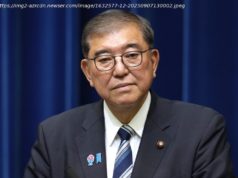This week, President Trump arrives at the United Nations headquarters in New York City to lead the security council meeting. Though the issue of frivolous…
This week, President Trump arrives at the United Nations headquarters in New York City to lead the security council meeting. Though the issue of frivolous spending at the international governmental organization (IGO) will likely not be addressed, the Trump administration has set the admirable tone of cutting down waste and introducing much-needed oversight.
President Trump has already begun to take action on the big-picture spending items, withdrawing $2 billion from the Green Climate Fund, a U. N. project rife with ineptitude and prioritization woes that ensure poor returns for taxpayers. Even during his security-centric visit to the world’s foremost IGO, President Trump must stand up for taxpayers and end outrageous spending.
Despite only speaking before the U. N. Security Council, President Trump has a unique opportunity to call out waste that has engulfed the international organization for decades. In keeping with the security focus, he could begin by pointing out the myriad of failures surrounding U. N. “peacekeeping operations.”
In fact, more than a quarter of peacekeeping operations are funded out of the U. S. Department of Defense’s budget. But the U. N.’s sloppily conceived missions fail to live up to their namesake, exacerbating global issues and resulting in human rights abuses.
A U. N. high-level independent panel on Peace Operations concluded in 2015 that the “focus of peace processes and Statebuilding efforts tends to be on the capital and on a small political and civil service elite,” to the detriment of peacekeeping operations. And when peacekeepers do interact with vulnerable villagers, the results are often devastating.
In the Congo, hundreds of civilians have documented sexual abuse complaints against the UN force entrusted to protect them. Fourteen-year-old girls in U. N.-guarded camps should not have to fear being violated by “peacekeepers.” And Congo is hardly the only place that’s been victimized by predators in blue helmets: there have been thousands of complaints worldwide over the last decade alone.
The U. N.’s habit of barring host countries from participating in abuse investigations only furthers the perception of a corrupt, unresponsive organization.
Unfortunately, the U. N.’s unaccountable missions and operations don’t end at “peacekeeping.” Take, for instance, the World Health Organization (WHO), a specialized agency within the U. N. to “direct international health within the United Nations’ system and to lead partners in global health responses.” But in leading international health efforts, there’s a sobering disparity between dollars allocated and help on the ground.
At the height of the Ebola crisis, former WHO Director-General Margaret Chan doled out tens of thousands of dollars in taxpayer funds for a luxurious presidential suite at the Oceanside Palm Camayenne Hotel. As this official, and others in a similarly high position, enjoyed top-tier accommodations, the first responders on the ground lacked the resources and manpower to effectively help disease victims. These luxurious accommodations highlight the larger problem of profligate travel spending at the WHO.
In 2016, WHO travel expenses exceeded $200 million for just over 7,000 staff employees. Astonishingly, travel expenses surpassed the combined total that the WHO spent fighting AIDS and hepatitis ($70.5 million), malaria ($61 million), and tuberculosis ($59 million) during that year.
And, taxpayer-funded travel abuses don’t stop at the WHO. Other U. N. sub-agencies have issues with excessive travel costs. The Guardian reported that “Erik Solheim, executive director of UN Environment, was traveling for 529 out of the 668 days audited, spending $488,518 (£370,380), according to the report. The audit also said he had ‘no regard for abiding by the set regulations and rules’ and claimed unjustified expenses.”
Fortunately, organizations and governments are beginning to hold the U. N. and her sub-agencies accountable for these travesties. This year, the Taxpayers Protection Alliance formed IGO Watch, an international coalition of taxpayer groups from around the world tasked with holding global bureaucracies accountable for misguided priorities and wasteful spending.
And for the first time, watchdog efforts are being relayed to the US government, where President Trump and similarly-minded officials look for ways to make American participation in IGOs more worthwhile and cost-effective.
At the end of 2017, the U. S. mission to the U. N. touted that they “reduced the U. N.’s bloated management and support functions, bolstered support for key U. S. priorities throughout the world, and instilled more discipline and accountability throughout the U. N. system.” But far more work needs to be done, with the US and allies ensuring a lighter load for taxpayers at every step of the way.
Ross Marchand is the director of policy at the Taxpayers Protection Alliance.
The views and opinions expressed in this commentary are those of the author and do not reflect the official position of The Daily Caller.






